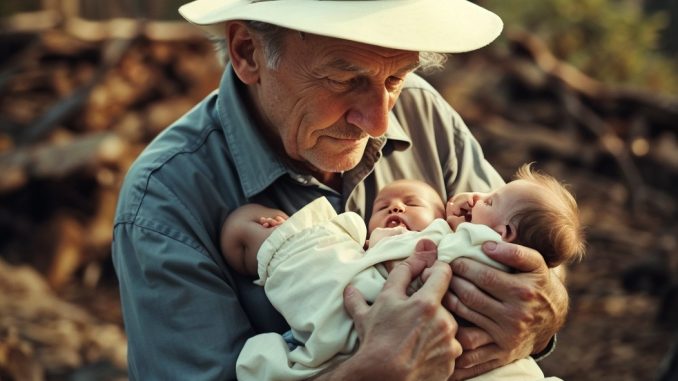
The morning mist clung low to the earth, like a memory too stubborn to let go. In a quiet valley where the forest kissed the worn edges of an old, weary farm, seventy-year-old Eli Warren walked slowly through the damp spring grass. His boots sank slightly into the softened ground, and at his side trotted Rusty—his loyal, aging mutt with eyes still shining with mischief and wonder.
Since his wife passed, Eli had lived in solitude, tending to the land they had once built side by side. Though the world around him had fallen into silence, it was not a comforting one—only a haunting echo of what used to be.
But something about that morning felt unusual. Rusty, typically content to explore the familiar trail, suddenly stopped—rigid and alert. Then, without a sound, he took off toward the pine grove on the edge of the farm.
— What is it, boy? — Eli called, worry coloring his gravelly voice.
He followed as best as his aching joints allowed, ducking under branches until he heard it—a faint, trembling sound. Then another. He parted the trees, and the sight that met him stopped him cold.
Three tiny infants.
They lay bundled together in a rough nest of cloth and leaves, fragile and still save for a few soft whimpers. Their blankets were worn and thin, and the air held a sharp chill—not just of the season, but of something deeper. Eli shivered, not from the cold, but from disbelief.
— Merciful God… — he whispered.
He knelt carefully, hesitant to touch them, almost expecting them to fade like mist. But they were real—achingly so. Two girls and a boy, barely conscious, eyes pleading. Cold. Afraid. Needing someone.
As he scooped them into his arms, he noticed a strange detail: each wore a slender silver necklace. One bore a crescent moon, another a tiny sun, the last a star. Their surfaces caught what little light filtered through the trees.
Then—stillness.
Once in his arms, the babies went silent, drawn into the warmth and gravity of his presence. Eli’s heart, long dulled by grief, beat with new purpose. He turned for home, clutching them close, murmuring for Rusty to stay near.
Back in the farmhouse, he revived the old stove and swaddled the infants in every blanket he could find. Though he hadn’t cared for a child in decades, instinct guided his hands. He warmed canned milk, feeding them carefully, drop by drop. Their hunger pained him—not just physically, but with the realization that someone had left them here… with him. Why?
While changing one of the worn blankets, a slip of paper fluttered out. It was smudged and creased, but the message was clear:
“Please love them more than I can. I’m sorry.”
Eli stared at the note, his fingers tracing the words. This wasn’t abandonment born of malice, but of heartbreak—and perhaps, hope.
He called Lena, a retired nurse and longtime friend. When she arrived, she took in the scene with quiet compassion. She helped clean and feed the babies, gently examining each one.
— What now? — Eli asked.
Lena paused, then said softly,
— We protect them. We figure it out. You saved them, Eli. That’s what matters most.
Word traveled quickly through their small mountain town. But the people came not with questions, only kindness—bringing diapers, bottles, and warm clothes. The town embraced the mysterious children, and the man who had unexpectedly become their guardian.
No trace of their parents was ever found. Only the letter “L” engraved on each charm hinted at anything from their past—one letter, no names.
Weeks passed. The babies began to grow stronger. Eli named them after what they brought into his life: Hope, Joy, and Ray. His once-quiet home now echoed with laughter, cries, and the rustling of new life. Rusty watched over them with quiet devotion. Eli smiled more—sometimes through tears, but always with love.
Then one day, a letter arrived—no return address, only his name written in elegant script.
Inside, a simple message:
“They were all I had left. I couldn’t give them the life they deserved. But I chose your land because I believed you still could.”
Eli tucked the letter away beside the first note, telling no one—not even Lena. Some truths, he believed, were meant to be carried in the heart alone.
As time passed, the children became the heart of the village. And Eli, once just a lonely man on a fading farm, became a grandfather, a guardian, a quiet legend.
Years later, when the children asked about their necklaces, Eli would smile and say,
— They’re proof that you were meant to find each other. And that I was meant to find you.
Because sometimes, life lays miracles gently at your feet. And if you’re brave enough to embrace them—even through fear and doubt—you might just discover your story isn’t ending. It’s only just begun.
Leave a Reply